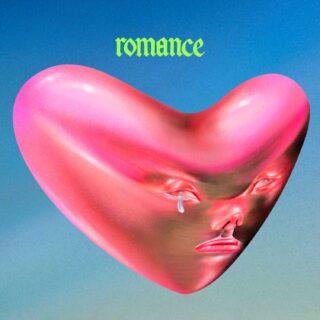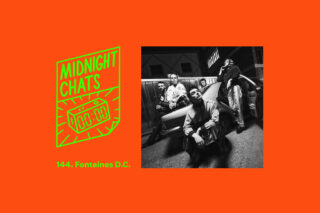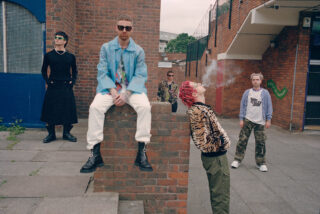Fontaines D.C.
Romance
(XL)
8/10

(XL)
8/10
Bands used to be up for dressing like maniacs. David Bowie may have needed to force the rest of the Spiders From Mars into their high heeled boots and sequin catsuits (until they soon discovered that young women couldn’t keep their hand off of them) but the alien himself bounded on to an eyepatch, copper quiff, giant lapels, more giant shoulder pads, a grandad cap, a sailor’s cap, a painted face and silver… rags (?) with gleeful abandon, applauded all the way to his Alexander McQueen Union Jack trench coat in 1997, which might have been the only time he felt like one of the crowd. They say that whenever you resort to bringing up Hitler you’ve already lost the argument, and it’s starting to feel that way with Bowie: Bowie could pair a scarlet playsuit with a polka dotted neckerchief and the head of a pirate and no authorities would be called, many will say, simply because he was David Bowie. But there have been others. Bono hasn’t dressed like a civilian since he was called Paul; Mick Jagger wore a Shakespearean white dress to the Stones’ 1969 Hyde Park concert only to spend the next decade in leggings and optional t-shirt; Depeche Mode and their leather vests; Pet Shop Boys and their cone hats; new romantics and their hairsprayed everything. Mainstream artists; not metal bands or goths or novelty acts… for the most part.
Perhaps the knack has always been to arrive at the party outrageous. To reinvent yourself as you turn up to university, not a few months in after everyone has seen you in your Ben Sherman shirts and nothing-cut jeans. The Beatles copped it when they went from clean-cut hand-holders to heavy-lidded beardos (the tonal and aesthetic leap from ‘Please Please Me’ to ‘Happiness is a Warm Gun’ never to be repeated), and I can actually remember the cries of horror when Take That turned up on Live & Kicking to show off their “mature” new look in 1994, introducing school kids over to the anarchy of white dreadlocks and how hard a young man can look when he shaves his head without needing to. Perhaps that’s why Irish one-time-punk band Fontaines D.C. have been getting a lot of flack for how they’re presenting their fourth album, Romance – because after five ascending years of wearing misshapen knitwear in resolutely indie earthtones fans are locked into what this band is supposed to look like: a brooding, lyrical, serious rock group, not a hybrid of (in the band’s own words) ‘90s nu metal giants Korn, experimental R&B artist Shygirl, and hip hop peacocks Outkast. It really is a handbrake turn, best illustrated by comparing Fontaines’ recent cover shoot with Crack magazine (where they first unveiled their new look) to our own L&Q cover from 2019, shortly after the release of the band’s debut album, Dogrel. It takes a while to match up who’s who. Personally, I love it. A bit too Yungblud, perhaps, but maybe one of the reasons indie rock in the mainstream is dying on the vine is because we’ve had far too many years of bands (no doubt self-conscious and fearing the sort of backlash Fontaines have experienced these last two months) denying themselves the pleasure of having a bit of fun with this increasingly ludicrous way of making a living.

What Fontaines haven’t felt the need to do is reassure fans that they want to be dressing this way right now. Romance is their fourth album and their first with new label XL Recordings, but contrary to the presumption that their new deal must have ushered in an age of strong-willed stylists and a direction enforced upon them, there is no stylist at all. The pink twisted hair of guitarist Carlos O’Connell, the heavy skirts of singer Grian Chatten, the bug-eye wraparounds, parachute pants and textured fluoro jackets have come exclusively (and you have to say skillfully) from them. On last week’s episode of our Midnight Chats podcast, Chatten said of Romance’s aesthetics: “When the record comes out I think people will realise that it’s a record influenced by a vision of dystopia. It’s a futuristic record, and it’s inspired by cinema. And I think we just wanted to visually draw from these inspirations in order to ensure that people don’t fit the record into a Dogrel-shaped box. Because I think some people just want to hear ‘Boys in the Better Land’ over and over again. And you can. Just put it on loop, it’s got nothing to do with me. It was just a way to make sure that our new stuff was communicated in the right way.”
He and the band must be pleased: Romance is an undeniable success against that yardstick. Dogrel it is not, although let it be said that nothing has been since its release in 2019. ‘The Boys in the Better Land’ came to embody that young, shouty punk album that surfed in on the emergence of IDLES while refusing to hide its library card: come for the dive-bombing guitars of ‘Hurricane Laughter’, designed only to wind up circle pits; stay for the poetic puzzle of ‘Television Screens’, especially if you were ever a fan of Idlewild. Fontaines adopted a policy of forward motion from the moment Dogrel was released, it seems, that has proven to be their biggest strength and defining attribute. A Hero’s Death, released just one year later, slowed things down as if the band had already tempered the adrenaline of their wildest dreams coming true, Chatten revelling in repeated refrains and the sound of his band settling into a menacing chug. With a little distance from 2022’s practically perfect Skinty Fia, perhaps it makes perfect sense that the band’s next move would be towards gnarlier guitar sonics, a good amount of them pulling from shoegaze and, in the case of ‘Jackie Down the Line’, good old fashioned baggy, while the band explored themes of Irish diaspora following a majority of them moving from Dublin to London. Romance is something different again. And again. And again. From one track to the next, until all 11 tracks are over. That’s where Fontaines have really mixed things up this time around. Less a case of their songs moving forward in sound en masse, as previously; more a case of each track offering a glimpse at a different Fontaines D.C. facet and possibility. The multiverse approach. Everything everywhere all at once. It sounds like what I want to say is that Romance is a fucking mess, but that’s not the case. Or if it is, it’s a mess to embrace.

People will no doubt say that this is an eclectic group of tracks that nevertheless hangs together and sounds resolutely like a record from the band that created it. I don’t want to say that but I know that I can’t disagree with it. It’s something that Grian Chatten is slowly coming to terms with himself; that whatever Fontaines do, it will now only sound like them, predominantly because Chatten’s voice – his vocals deep and coarse, his Dublin accent front and centre – is so distinctive an anchor. Perhaps that’s why Romance is such a sandpit of an album; a free hit that essentially works so well because, different in styles though they are, a vast majority of its songs are so expertly executed.
Chatten says that it’s the first album where he loves the sound of his own voice, and in our podcast interview he took a moment to appreciate the irony in that being the case and me having to check with him that it’s him singing the opening title track. ‘Romance’ isn’t delivered in his trademark Irish grain. Initially it sounds like it must be Thom Yorke, with the band in spidery Cure mode. They tinkle to incoming blasts of fuzz guitar that make the brand of romance Chatten is singing about possessive and murky and a bit I-love-you-too-much. It’s a thrilling, scuzzy start that we never fully return to, even if the following ‘Starburster’ hangs on a certain chilly darkness too, written as it was as a stream of consciousness by Chatten following a panic attack in a train station. It was this track, released as the lead single, that launched the band’s return; a red herring of a song that, again, flies by like the view from a train. When I first heard ‘Starburster’ I would have welcomed it not being representative of the whole of Romance on account of its hip-hop drumbeat and Chatten’s semi-rapped verses combining to remind me so much of Kasabian. Over time I’ve softened on that, perhaps on account of its origin story, perhaps its wilfully black hook of Chatten gasping for air, but probably because I can’t get it out of my head – a song you want to learn all the words to probably never will.
The dystopian through line the band talk about is the clearest thing to grasp onto amidst the carousel of different indie styles. Romance isn’t as simple as Richard Curtis would like us to believe, and Fontaines are operating more in the vein of ‘Every Breath You Take’ here than ‘I Will Always Love You’ (the giant heart on the album’s sleeve is crying, after all). Dip into any of the lyrics across the record and you’re almost certain to find something that hints at another story: “And if you change your mind / I will be waiting / I know your thoughts / They’re mine as well,” on the grungy ‘Here’s The Thing’, played on guitars that hang below the knees, born out of an argument between Chatten and Carlos O’Connell; “Changed my name to “promise you” yeah / Dying inside cuz I want to yeah,” goes the desperate opening of ‘Bug’, initially an unassuming, upbeat track that could easily become an underrated favourite, with a chorus that almost sounds like The Lightning Seeds (a compliment). And then there’s the band’s convincing ode to Lana Del Rey; a breathy ballad called ‘In The Modern World’ where Chatten “don’t feel bad” as part of a disillusioned throuple waiting out a crumbling world, going on to confirm, “In the modern world, in the modern world / I don’t feel anything, in the modern world.” I did say it was convincing. It might also be Romances’ best track, although can you really make a call on that when it’s surrounded by Pixie-ish ‘90s rock (‘Death Kink’), a beautifully weighted late-album triple of dream pop (‘Motorcycle Boy’), shoegaze (‘Sundowner’, written and sung for the first time by guitarist Conor Curley) and absurdist balladry (the O’Connell penned ‘Horseness Is The Whatness’, named after a line from James Joyce’s Ulysses, in case you were worried the band had stopped reading altogether), or the outlier of outliers, ‘Favourite’, uncannily channeling The Cure’s ‘Just Like Heaven’ in its sprightly guitar riff? As that song sighs to an end and closes the record in against-the-grain fashion (“You’ve been my favourite for a long time” has never sounded more pure) it’s clear how much Fontaines D.C.’s new look is not a signifier of how their new album simply sounds. Lairy as it is, it’s too uniform for that, even if the 1990s are never far away from a majority of these varied songs. Think of it more as a flaming sign that the band has no intention of going backwards. They’ve always been clear about that, but on Romance the message is supercharged via 11 quite brilliant songs that share in common how fully realised they are. A ‘Best Of’ from an imagined band who tried everything once.